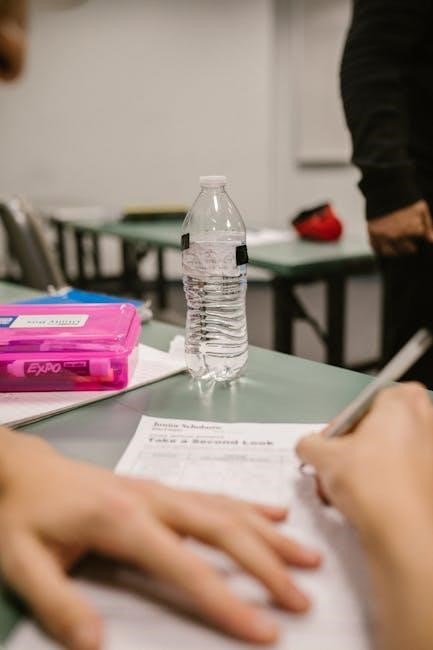
-
By:
- ida
- No comment
school function assessment pdf
The School Function Assessment (SFA) is a comprehensive tool designed to evaluate students’ functional skills and participation in school activities, aiding in educational planning for students with disabilities.
1.1 Overview of the SFA
The School Function Assessment (SFA) is a comprehensive tool designed to evaluate students’ functional skills and participation in school-related activities. It is primarily used for students with disabilities to identify their strengths and support needs. The SFA consists of three main components: participation in school activities, supports needed for tasks, and performance of specific activities. This assessment is completed by school professionals familiar with the student, such as teachers or occupational therapists. The SFA provides valuable insights for collaborative program planning and informs the development of Individualized Education Programs (IEPs). By focusing on functional tasks, it helps ensure students can fully engage in their educational environment.
1.2 Importance of the SFA in Educational Settings
The School Function Assessment (SFA) plays a vital role in educational settings by providing insights into students’ functional abilities and participation in school activities. It is essential for identifying the support needs of students with disabilities, ensuring they receive appropriate accommodations and interventions. The SFA aids in the development of Individualized Education Programs (IEPs) by offering specific, measurable goals tailored to each student’s requirements. This tool fosters collaboration among teachers, therapists, and parents, promoting a unified approach to supporting students. By focusing on functional skills, the SFA helps create an inclusive learning environment, enabling students to achieve their full potential and engage meaningfully in academic and social activities.

Structure and Components of the SFA
The School Function Assessment (SFA) is structured into three key components: participation in school activities, supports needed for tasks, and performance of specific activities, evaluating functional abilities.
2.1 Participation in School Activities
The School Function Assessment (SFA) evaluates a student’s ability to participate in school-related activities, focusing on their engagement in academic and social tasks. This section assesses how students interact in group work, contribute during discussions, and join extracurricular activities. Educators and professionals observe and rate the student’s involvement, identifying challenges that may hinder full participation. The goal is to understand the student’s ability to integrate into the school environment and engage meaningfully with peers and activities. This information is crucial for developing strategies to enhance participation and ensure inclusive educational experiences tailored to the student’s needs;
2.2 Supports Needed for Tasks
This section of the School Function Assessment (SFA) identifies the types of support students require to complete specific tasks in a school setting. It evaluates the need for accommodations, modifications, or assistive devices that enable students to perform academic and functional activities effectively. Supports may include adaptive equipment, visual aids, or behavioral strategies to enhance task completion. The assessment also considers the level of adult assistance or peer support required, providing insights into the resources needed to ensure student success. By understanding these support needs, educators and professionals can develop targeted interventions and accommodations to help students achieve their educational goals. This section is critical for creating personalized learning plans.
2.3 Performance of Specific Activities
This section evaluates a student’s ability to perform specific tasks essential for school participation. It assesses functional skills like using materials, writing, and engaging in academic activities. The SFA also examines social interactions and behavior management. By rating task performance, educators identify strengths and challenges, informing targeted interventions. This part ensures students receive tailored support to enhance their functional capabilities and overall school performance. The focus is on observable actions and practical abilities, providing a clear understanding of how students navigate their educational environment. This data is crucial for developing strategies that promote independence and success in school-related tasks. It aligns with IEP goals, fostering a collaborative approach to student support.

Target Population for the SFA
The SFA is primarily designed for students with disabilities, focusing on identifying their support needs to enhance participation and performance in school settings effectively.
3.1 Students with Disabilities
The School Function Assessment (SFA) is specifically designed for students with disabilities, aiming to identify their strengths, challenges, and support needs in school settings. It evaluates their ability to participate in academic and social activities, providing insights into functional skills required for daily school tasks. The SFA helps educators and therapists understand how to tailor interventions and accommodations to meet individual needs. By focusing on participation, supports, and activity performance, the SFA ensures that students with disabilities receive targeted assistance to thrive in their educational environment. This assessment is a vital tool for developing personalized plans, such as IEPs, to promote inclusivity and success.
3.2 Identifying Support Needs
The School Function Assessment (SFA) plays a crucial role in identifying the specific support needs of students, particularly those with disabilities. By evaluating participation, task supports, and activity performance, the SFA provides insights into the accommodations and interventions required to help students succeed. This assessment highlights areas where students may need additional resources, such as assistive technologies, behavioral supports, or modified learning strategies. The SFA’s detailed evaluation ensures that support plans are tailored to individual needs, fostering an inclusive and effective learning environment. This process enables educators and therapists to collaborate in developing targeted interventions, ultimately enhancing students’ ability to participate fully in school activities.

Administration and Scoring of the SFA
The SFA is administered by professionals familiar with the student, such as teachers or occupational therapists, to assess functional skills and participation in school activities.
4.1 Who Can Administer the SFA
The SFA is typically administered by school professionals familiar with the student, such as teachers, occupational therapists, or special education staff. These individuals have direct knowledge of the student’s abilities and challenges, ensuring accurate assessment. The tool is designed for professionals who can provide insights into the student’s functional skills and participation in school activities. Collaboration among educators and therapists is encouraged to gather comprehensive data. The administrator should have a thorough understanding of the student’s daily interactions and performance in the school environment. This ensures the assessment reflects the student’s true capabilities and needs, supporting effective IEP development and intervention planning.
4.2 How to Interpret SFA Results
Interpreting SFA results involves analyzing scores across participation, task supports, and activity performance to identify a student’s strengths and challenges. The assessment provides criterion-referenced scores, comparing a student’s abilities to expected functional levels. Higher scores indicate greater independence, while lower scores highlight areas needing support. Results are used to guide IEP development, informing goals and interventions. Professionals collaborate to interpret the data, ensuring tailored support plans. The SFA results also help monitor progress over time, enabling adjustments to strategies as needed. By focusing on functional skills, the assessment supports creating a personalized learning environment that fosters student success and inclusion. Accurate interpretation is essential for effective educational and therapeutic planning.

Clinical and Educational Applications of the SFA
The SFA is a valuable tool for both clinical and educational settings, aiding in the development of IEPs and informing occupational therapy strategies to support students’ functional needs.
5.1 Role in IEP Development
The School Function Assessment (SFA) plays a pivotal role in the development of Individualized Education Programs (IEPs) by providing detailed insights into a student’s functional abilities and support needs. IEPs are tailored plans designed to address the unique requirements of students with disabilities, ensuring their access to appropriate educational services. The SFA’s structured framework helps identify specific goals and accommodations, enabling educators to craft targeted interventions. By assessing participation, task supports, and activity performance, the SFA offers a comprehensive foundation for IEP development. This ensures that the plan aligns with the student’s strengths, challenges, and environmental needs, fostering a collaborative approach between educators, families, and professionals.
5.2 Use in Occupational Therapy
The School Function Assessment (SFA) is a valuable tool in occupational therapy, providing insights into a student’s ability to perform tasks essential for school participation. Occupational therapists use the SFA to identify specific areas where students may need support, such as using classroom tools, moving within the environment, or engaging in social interactions. By evaluating participation, task supports, and activity performance, the SFA helps therapists develop targeted interventions to enhance functional skills. This tool also facilitates collaboration between therapists, educators, and families, ensuring a comprehensive approach to addressing the student’s needs. The SFA’s detailed framework makes it an effective resource for monitoring progress and adapting therapy plans to promote independence and success in the school setting.
The School Function Assessment (SFA) is a pivotal tool in evaluating students’ functional abilities and participation in school activities. By addressing participation, task supports, and activity performance, the SFA aids in creating tailored interventions for students with disabilities. Its role in IEP development and occupational therapy underscores its versatility and importance in educational settings. The SFA not only helps identify support needs but also fosters collaboration among educators, therapists, and families. As a comprehensive and reliable assessment, it remains a cornerstone in promoting student success and inclusion, ensuring that each student’s unique needs are met effectively. The SFA’s impact extends beyond academics, contributing to the holistic development of students in their educational journey.